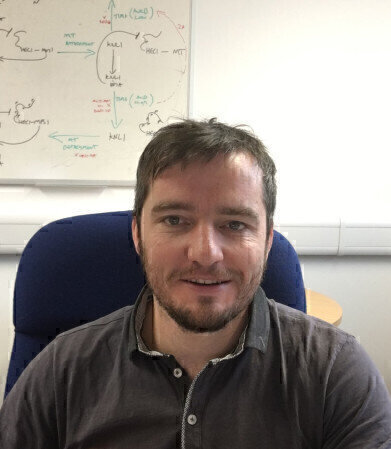-
 Adrian Saurin
Adrian Saurin
News
Funding Boost for Research into Cellular Division Errors
Feb 19 2016
The University of Dundee’s Dr Adrian Saurin has been awarded £1.3million to explore how the body’s cells replicate themselves correctly and why this goes wrong in cancer.
Dr Saurin, of the University’s School of Medicine, has received the funding from Cancer Research UK to carry out fundamental research into the mechanism of cellular division. Four new posts will be created as part of the six-year study.
When division occurs, the new cells should be exact copies of the original but this process goes wrong in the vast majority of cancer cells. The result is that cells within the same tumour often have a genetic makeup that is diverse and constantly changing. This is important because it allow tumours to rapidly evolve and overcome any challenges they may face.
Dr Saurin and his team hope to understand the molecular basis for these errors by focussing on an area that is currently not well understood but which may have implications for other diseases.
It is well established that two major classes of enzymes – kinases and phosphatases – control almost every signalling response in the body at some level but, until now, they have been almost exclusively studied independently. As Dr Saurin points out, however, there are many cases in which these opposing enzymes need to work together.
“There is a huge body of work to show how kinases turn signals on and we are slowly beginning to understand how phosphatases work to switch these signals off,” explained Dr Saurin. “If all signals were simple binary on/off switches then we would soon have a good appreciation for how they work.
“In reality however, signal responses are often far more complex than that – they come in a variety of different shapes and sizes that must be precisely regulated in both time and space. This is very likely to require kinases and phosphatase to work together and yet this ‘cooperativity’ is something we know almost nothing about.”
The award will allow the Dundee team to explore why this is particularly relevant for cell division. Dr Saurin and his colleagues previously found that a key division checkpoint relied on the cooperative action of two kinases and two phosphatases to work correctly.
Digital Edition
Lab Asia Dec 2025
December 2025
Chromatography Articles- Cutting-edge sample preparation tools help laboratories to stay ahead of the curveMass Spectrometry & Spectroscopy Articles- Unlocking the complexity of metabolomics: Pushi...
View all digital editions
Events
Jan 21 2026 Tokyo, Japan
Jan 28 2026 Tokyo, Japan
Jan 29 2026 New Delhi, India
Feb 07 2026 Boston, MA, USA
Asia Pharma Expo/Asia Lab Expo
Feb 12 2026 Dhaka, Bangladesh


















